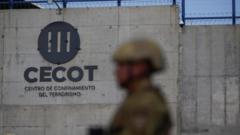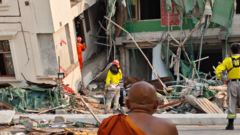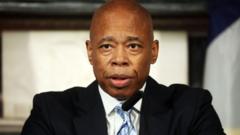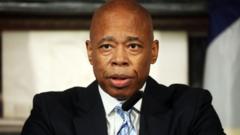Amid legal contention, the Supreme Court intervenes to pause a lower court ruling demanding the return of Kilmar Abrego Garcia, a Salvadoran man deported under disputed circumstances.
Supreme Court Halts Deportation Reinstatement of Salvadoran Man Amid Legal Controversy

Supreme Court Halts Deportation Reinstatement of Salvadoran Man Amid Legal Controversy
The Supreme Court issues a temporary stay on deportation reversal for Kilmar Abrego Garcia, a Salvadoran man allegedly deported in error.
In a significant legal move, the US Supreme Court has granted a request to temporarily suspend a lower court’s order that mandated the return of Kilmar Abrego Garcia, a Salvadoran man deported back to El Salvador under contentious circumstances. The case has drawn attention, not only for its implications on immigration law but also for the ongoing tensions surrounding judicial authority and executive power.
Kilmar Abrego Garcia, who entered the United States illegally as a minor, was deported on March 15, following a Trump administration initiative. The administration claims that this deportation was necessitated by an “administrative error,” while alleging that Garcia has ties to the MS-13 gang—a claim that his lawyer has vehemently denied. The Supreme Court's Chief Justice John Roberts issued a stay just hours before a deadline that required Garcia's return to the U.S., allowing the Court to review the contentious case.
In its emergency appeal, the Trump administration contended that a Maryland district judge lacked the authority to order Garcia’s return and emphasized that the U.S. cannot compel the government of El Salvador to act against its sovereign interests. The U.S. Solicitor General, D John Sauer, argued that “the Constitution charges the president, not federal district courts, with the conduct of foreign diplomacy and protecting the nation against foreign terrorists.”
Garcia is currently being held in a maximum-security facility known as the Terrorism Confinement Center (Cecot), where he faces allegations of association with gangs—a matter that his legal representation contests, asserting that he holds no criminal history. The narrative surrounding Garcia’s case took a turn when he had been granted protection from deportation in 2019 based on the risks he might face in El Salvador due to gang violence.
Legal representatives for Garcia have characterized his deportation as "the equivalent of a forcible expulsion," expressing confidence in a favorable resolution from the Supreme Court regarding Garcia's situation. U.S. District Judge Paula Xinis, who criticized the administration’s handling of the case, indicated that the deportation process lacked lawful authority, further complicating the administration's legal strategy.
Legal experts and advocates have voiced concerns about the broader implications of this case for immigration policy and judicial oversight, especially against the backdrop of ongoing debates regarding the powers and limitations inherent to immigration enforcement and the judicial system's role in that process. The upcoming days will be crucial as the Supreme Court prepares to evaluate the underlying issues of jurisdiction and constitutional authority at play in Garcia’s deportation saga.
Kilmar Abrego Garcia, who entered the United States illegally as a minor, was deported on March 15, following a Trump administration initiative. The administration claims that this deportation was necessitated by an “administrative error,” while alleging that Garcia has ties to the MS-13 gang—a claim that his lawyer has vehemently denied. The Supreme Court's Chief Justice John Roberts issued a stay just hours before a deadline that required Garcia's return to the U.S., allowing the Court to review the contentious case.
In its emergency appeal, the Trump administration contended that a Maryland district judge lacked the authority to order Garcia’s return and emphasized that the U.S. cannot compel the government of El Salvador to act against its sovereign interests. The U.S. Solicitor General, D John Sauer, argued that “the Constitution charges the president, not federal district courts, with the conduct of foreign diplomacy and protecting the nation against foreign terrorists.”
Garcia is currently being held in a maximum-security facility known as the Terrorism Confinement Center (Cecot), where he faces allegations of association with gangs—a matter that his legal representation contests, asserting that he holds no criminal history. The narrative surrounding Garcia’s case took a turn when he had been granted protection from deportation in 2019 based on the risks he might face in El Salvador due to gang violence.
Legal representatives for Garcia have characterized his deportation as "the equivalent of a forcible expulsion," expressing confidence in a favorable resolution from the Supreme Court regarding Garcia's situation. U.S. District Judge Paula Xinis, who criticized the administration’s handling of the case, indicated that the deportation process lacked lawful authority, further complicating the administration's legal strategy.
Legal experts and advocates have voiced concerns about the broader implications of this case for immigration policy and judicial oversight, especially against the backdrop of ongoing debates regarding the powers and limitations inherent to immigration enforcement and the judicial system's role in that process. The upcoming days will be crucial as the Supreme Court prepares to evaluate the underlying issues of jurisdiction and constitutional authority at play in Garcia’s deportation saga.





















